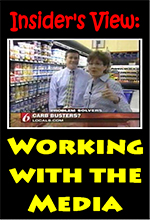The phone rings and you answer it to find your local television reporter calling about the news that just broke on Alzheimer’s disease. She wants you to come down to the station immediately for a quick interview and plans to use your sound bite on tonight’s 11:00 pm news. This is your chance to get in the door. You’ve had an interest for some time in working with the media and taking your health message to the public. However, you have no clue where to start. You did one radio interview but that was a couple of years ago. Isn’t working with television different from working with radio or print, much less the Internet environment? Is professional ethics a concern? Do you need to consider potential conflict of interest? The answer to all of these questions is “yes.” There are many important tips for you to know for your segment to go smoothly and to have you come across as the knowledgeable health professional that you are. Utilize these seven sure-fire strategies to build a positive relationship with the media that keeps them coming back to you, the health professional.
Strategy # 1: Determine the Show Details
Find out who will conduct the interview and where. It could be the health or medical reporter but depending on the show format, a host or anchor may conduct the interview. A health or medical reporter will have a better knowledge of current medical and health issues. The host or anchor may not be familiar with your topic until the segment is reviewed right before the interview. Health and medical reporters tend to ask more in depth and probing questions related to your area of expertise and will have done their homework in preparing for the interview.
It’s not unusual to discuss the segment with a producer first and then with the host or anchor once you arrive for the segment, particularly in television. If at all possible, discuss ahead of time the questions you will be asked and find out how long the segment will last. This information helps you prepare your responses to fit the amount of time allowed. It’s also a good idea to ask about the audience. Who are they? Anything you can find out about their age range, gender, interests or level of knowledge helps you do a better job refining your responses.
Whether you provide written comments (print or Internet), taped expert commentary or appear on air live (both radio and television), find out whether you’ll be interviewed alone or with other guests. If you’re to appear with another guest on a live or taped show, ask who the guests are and inquire about their credentials. You want to be the one to decide if you’re comfortable appearing with the guests, particularly if the interview is live and you have different viewpoints and training.
Want to know more? This one-hour continuing education, Insider’s View: How to Work with the Media, will teach you seven sure-fire strategies to build a positive relationship with the media that keeps them coming back to you, the health professional.
About the Author(s):
Susan Mitchell, PhD, RD, FADA – Thousands of faithful listeners tune in to hear Dr. Mitchell’s radio and internet segments on Orlando’s AM580 WDBO where she’s been the nutrition expert for over 10 years or read her blog on ThirdAge.com. An award-winning registered dietitian, Dr. Mitchell serves on the health and medical advisory board of Family Circle magazine and is co-author along with Dr. Christie of three books—Fat is Not Your Fate, I’d Kill for a Cookie and Eat to Stay Young. A reliable source to the media, she has appeared on The Today Show, CNN, the TV Food Network, iVillageLive and the Daily Buzz. Dr. Mitchell is also quoted extensively in Reader’s Digest, Time, Redbook, Fitness, and Cooking Light.
Catherine Christie, PhD, RD, FADA – Dr. Christie is co-author along with Dr. Mitchell of three books, Fat is Not Your Fate, I’d Kill for a Cookie, and Eat to Stay Young. A Licensed Nutritionist, Certified Nutrition Specialist and Fellow of the American Dietetic Association, she earned her Ph.D. from Florida State University. Dr. Christie is Nutrition Program Director and MSH/Dietetic Internship Director at the University of North Florida. In her 17 years of clinical practice, Dr. Christie consulted with many facilities and individuals in all areas of medical nutrition therapy. She has given over 1000 seminars to health professionals across the country. For two years, Dr. Christie was the Florida Media Representative for the American Dietetic Association and is often quoted in newspapers and magazines such as USA Today, Reader’s Digest, Cooking Light, New You, Family Circle, Woman’s Day, Cosmopolitan, Glamour, Child, Women’s World, Jacksonville Magazine, and Shape Cooks.
Accreditation Statement:
APA: American Psychological Association
ASWB: Association of Social Work Boards (#1046)
CDR: Commission on Dietetic Registration (#PR001)
NBCC: National Board for Certified Counselors (#5590)
NAADAC: National Association of Alcohol & Drug Abuse Counselors (#00279)
California: Board of Behavioral Sciences (#PCE1625)
Florida: Boards of SW, MFT & MHC (#BAP346); Psychology & School Psychology (#50-1635); Dietetics & Nutrition (#50-1635); Occupational Therapy Practice (#34). PDResources is CE Broker compliant.
Illinois: DPR for Social Work (#159-00531)
South Carolina: Board of Professional Counselors & MFTs (#193)
Texas: Board of Examiners of Marriage & Family Therapists (#114) & State Board of Social Worker Examiners (#5678)

